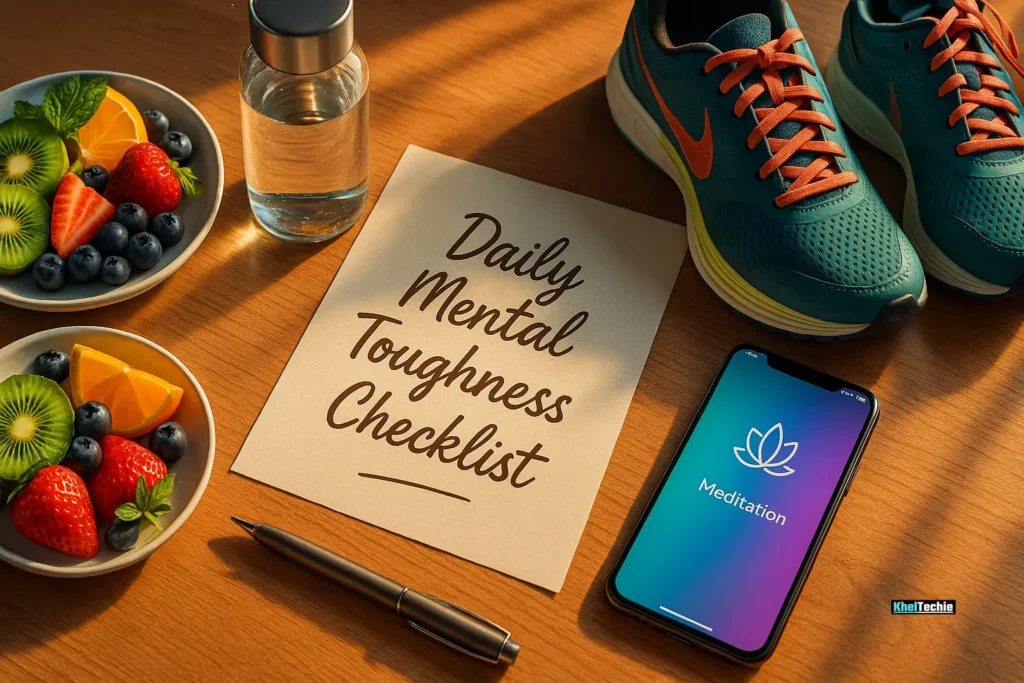How To Train Your Brain: 7 Mental Toughness Techniques That Work
Let’s be real, life doesn’t always go as planned.
We all hit walls sometimes. Maybe it’s a tough job, a painful breakup or simply waking up feeling anxious for no reason. In those moments, one thing sets people apart: mental toughness.
But here’s the secret: Mental toughness isn’t just something you’re born with, it’s a skill you can train. In this guide, you’ll discover how to train your brain for mental toughness: 7 powerful techniques that’ll help you stay calm under pressure, bounce back from setbacks and keep moving forward even when life gets rough.
Ready to level up your mind? Let’s dive in.
Also read – Best Books for Mental Health

What Is Mental Toughness?
Mental toughness is often confused with personality traits like stubbornness or grit, but it’s more than that. Imagine your brain is like a muscle, You wouldn’t expect to bench press 200 lbs if you’ve never lifted weights, right? Mental toughness works the same way. It’s your mind’s capacity to handle stress, challenges and emotions without crumbling.
In simple terms, mental toughness is:
- Staying cool under pressure
- Adapting to changes or failures
- Keeping your emotions in check
- Sticking to your goals no matter how tough it gets
According to Dr. Peter Clough, who developed the 4Cs model, mental toughness includes:
| The 4 Cs of Mental Toughness | Description |
|---|---|
| Control | Belief you can influence outcomes and emotions |
| Commitment | Sticking with tasks even when tough |
| Challenge | Seeing setbacks as opportunities |
| Confidence | Trusting your abilities |

Why Training Your Brain for Mental Toughness Matters
In today’s fast-paced world, training your brain for mental toughness isn’t just a “nice-to-have”, it’s a superpower that can transform your life from the inside out. Imagine being able to push through fatigue, stay laser-focused under pressure and bounce back from setbacks with renewed energy. That’s what mental toughness delivers and the latest science proves it’s within everyone’s reach.
A 2023 clinical study found that mental training can boost your endurance by over 10% in just three weeks. This isn’t just about feeling better; it’s about real, physical changes in your body. Mental exercises, like visualization, positive self-talk and mindfulness help your brain regulate stress, reduce muscle fatigue and keep you going when your body wants to quit. Think of it as a workout for your mind, with benefits that spill over into every area of your life.
But the impact doesn’t stop at physical performance. According to a 2025 review, Mental toughness training is a game-changer for stress management and focus. By setting clear goals, practicing mindfulness and challenging negative thoughts, you can stay calm even when life throws curveballs your way. This means fewer sleepless nights, more motivation and the confidence to tackle challenges head-on.
What makes this so unique? Unlike old-school “tough it out” advice, today’s approach is science-backed and practical. Anyone athlete or not, can start building mental resilience with simple daily habits. The result? You become the kind of person who thrives under pressure, adapts to change and inspires others with your grit.
So, if you want to unlock your full potential, start training your brain for mental toughness today.

7 Powerful Techniques to Train Your Brain for Mental Toughness
Let’s dive into the core of this article, the 7 powerful techniques you can use to build unbreakable mental strength.
1. Master Your Self-Talk
Your inner dialogue shapes how you see the world.
- Replace “I can’t handle this” with “I’ve handled hard things before.”
- Use affirmations like:
- “I am capable.”
- “I stay calm under pressure.”
Keep a “Victory Journal.” Each night, jot down 3 wins, big or small.
2. Embrace Discomfort Gradually
Mental toughness grows in your discomfort zone.
- Take cold showers.
- Speak up in meetings.
- Try new experiences alone.
These small “stress exposures” teach your brain that discomfort ≠ danger.
3. Practice Visualization
Elite athletes visualize success before it happens. Why? The brain doesn’t fully distinguish between real and imagined experiences.
Picture yourself:
- Giving a confident speech
- Staying calm during an argument
- Crushing your workout goals
4. Use Mindfulness & Meditation
Mindfulness trains your brain to stay in the present instead of panicking about the future.
- Start with just 5 minutes a day.
- Apps like Headspace or Calm are great for beginners.
Benefits:
✅ Lowers stress hormones
✅ Improves focus
✅ Enhances emotional control
5. Build Grit Through Small Wins
Grit = passion + perseverance.
Set tiny goals and achieve them:
- “Today, I’ll write one paragraph.”
- “I’ll go for a 10-minute walk.”
Each win rewires your brain for confidence.
6. Train Recovery Like a Skill
Mental toughness isn’t about being “on” 24/7, it’s knowing how to recharge.
- Prioritize sleep
- Schedule downtime
- Practice active relaxation (yoga, hobbies, time in nature)
Lack of recovery can mimic symptoms of anxiety disorders.
7. Reframe Setbacks as Data, Not Defeat
This one’s huge.
Instead of thinking: “I failed.”
Think: “What can I learn from this?”
Athletes review game footage, not to feel bad, but to improve. Apply that same lens to your life.
Exercise: After a setback, write:
- What happened?
- What went well?
- What can I improve?
This trains resilience and keeps shame from taking over.

Common Mistakes to Avoid When Building Mental Toughness
Even with the best intentions, many people sabotage their progress. Here are the top mistakes to avoid:
| Mistake | Why It Hurts You | How to Fix It |
|---|---|---|
| Skipping consistency | Progress requires repetition | Create routines and habits |
| Ignoring emotions | Suppression leads to burnout | Acknowledge and process feelings |
| Overtraining | Mental fatigue leads to breakdown | Balance intensity with rest |
| Comparing yourself to others | Lowers confidence | Track your own growth |
| Neglecting nutrition | Poor fuel = poor brain function | Eat brain-boosting foods |

Daily Habits to Strengthen Your Mind
Building mental toughness isn’t just about big breakthroughs, it’s about small, consistent habits that rewire your brain over time. Think of it like brushing your teeth: a few minutes daily keeps your mental “hygiene” in top shape.
Here are some powerful daily rituals to weave into your life:
1. Morning Mindset Reset
How you start your day sets the tone.
- Practice gratitude. Write down three things you’re grateful for. It’s proven to boost mood and resilience.
- Read or listen to something inspiring for 5 minutes.
2. Move Your Body Daily
Exercise isn’t just for your biceps, it’s brain fuel.
- Aim for 30 minutes of movement: brisk walking, yoga, dance, whatever you enjoy.
- Physical activity increases BDNF, a brain protein linked to mental resilience.
3. Practice a Mini Digital Detox
Constant notifications fry your focus.
- Pick one hour each day to be device-free.
- Instead, read, meditate or simply sit with your thoughts.
This trains mental discipline and calms your nervous system.
4. Check in with Your Emotions
Avoid letting stress silently build up.
- At midday, pause and ask:
- How am I feeling right now?
- What do I need?
- Labeling your emotions reduces their power, a technique known as “affect labeling.”
5. Prioritize Deep Sleep
Your brain repairs itself during sleep.
- Stick to a consistent bedtime.
- Avoid screens an hour before bed.
- Try calming routines like reading fiction or light stretching.
Sleep deprivation erodes mental toughness and increases anxiety.
6. Nourish Your Brain
What you eat affects your resilience.
- Load up on omega-3s (salmon, walnuts).
- Reduce sugar spikes that can crash your mood.
- Stay hydrated, dehydration impacts cognitive performance.
7. Celebrate Small Wins
End each day with a quick mental recap:
- What did I handle well today?
- What tiny progress did I make?
This rewires your brain to look for successes rather than failures, a cornerstone of mental toughness.

A Daily Habits Quick Checklist
Here’s a handy daily mental toughness checklist:
✅ Morning gratitude journal
✅ 30 minutes movement
✅ One device-free hour
✅ Emotional check-in
✅ Sleep routine
✅ Brain-healthy meals
✅ Celebrate small wins
Print it. Stick it on your fridge. Let it guide you!
Also read – How to Improve Mental Health with Fitness

Final Thoughts: Train Your Brain, Transform Your Life
So there you have it, how to train your brain for mental toughness: 7 powerful techniques that can genuinely change how you face life’s challenges. Remember, mental toughness isn’t about becoming bulletproof, It’s about bouncing back stronger each time you fall. So start small, Pick one technique from above and practice it this week.
If this helped you or if you’ve got your own mental toughness hacks, drop a comment below or share this article with someone who could use a little extra grit. Let’s build unstoppable minds together.
This article is for informational purposes only and does not constitute medical, psychological, or professional advice. Always consult a qualified healthcare provider before starting any new mental health practices or if you’re experiencing significant distress.
FAQs: Answering Your Top Questions About Mental Toughness
Is mental toughness trainable or are you born with it?
Both! Genetics play a role, but science confirms you can train mental toughness just like muscles.
How long does it take to build mental toughness?
It varies. Research shows consistent habits (e.g., mindfulness, self-talk) can create neural changes in as little as 6–8 weeks.
Do athletes train mental toughness differently?
Yes. They use:
- Visualization
- Goal-setting
- Breathwork
- Sports psychologists
But the core techniques apply to anyone.
Can mental toughness help with anxiety?
Absolutely. By reframing thoughts and reducing fear responses, mental toughness can lower anxiety symptoms.
What exercises boost mental resilience fast?
Cold showers
Journaling
Meditation
Exposure to small challenges
How does mindfulness help mental toughness?
It builds awareness, helps you pause before reacting, and reduces rumination.
What’s the best book on mental toughness?
Check out “Grit” by Angela Duckworth and “Mindset” by Carol Dweck for life-changing insights.
Is mental toughness the same as ignoring emotions?
Nope. It’s feeling your emotions fully, but not letting them control your actions.
Can kids develop mental toughness?
Definitely. Encourage small challenges, praise effort, and teach coping strategies.
Does physical fitness help mental toughness?
Yes! Exercise reduces stress hormones and boosts confidence, a huge part of mental resilience.




